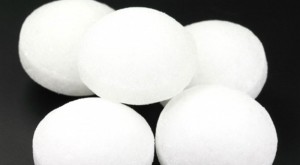Is it time for the Philippines to mothball mothballs?
Citing reports from a regulatory agency in the European Union, the EcoWaste Coalition on Friday urged the government to review its regulation on naphthalene mothballs after Bulgaria reportedly ordered the recall of the product from its market.
“The product poses a chemical risk because it contains pure naphthalene, which is toxic by inhalation, ingestion and dermal absorption,” the environment and health watchdog said, quoting a notification published on the website of the European Union’s Rapid Alert System for Non-Food Dangerous Products (Rapex) on Dec. 27.
According to EcoWaste, the withdrawal in Bulgaria of mothballs imported from the Philippines should be a wake-up call among makers and users of naphthalene-based pest control products.
“Despite the health concerns that prompted European countries to ban naphthalene balls, these cheap repellents against moths and silverfish are still widely available in the local market,” said Thony Dizon, coordinator of EcoWaste Coalition’s Project Protect, in a statement.
No health warnings
Dizon said that while the product sold in stores are packed with the warning, “naphthalene may cause haemolytic crisis,” or the rapid destruction of large numbers of red blood cells causing acute anemia, those sold by street vendors are simply packed in clear plastic bags “with zero product labels or health warnings.”
Quoting the Naphthalene General Information published by UK’s Health Protection Agency (HPA), the group warned that “naphthalene is toxic by all routes of exposure, whether it is ingested, inhaled or comes into contact with skin and eyes.”
According to the HPA, “(b)reathing fumes containing naphthalene, drinking solutions or swallowing solid naphthalene can cause nausea, vomiting, pain in the abdomen, diarrhea, confusion, sweating, fever, fast heart rate, rapid breathing and may lead to convulsions, coma and possibly death.”
As a precaution against “health-damaging exposure,” EcoWaste urged authorities “to impose a ban on the use of naphthalene and other hazardous substances such as paradichlorobenzene for pest control.”
The group added that the European Union, which includes Bulgaria, has banned the moth repellent product since 2008, while the International Agency for Research on Cancer has classified naphthalene as a possible carcinogen.
Originally posted: 1:48 pm | Friday, January 3rd, 2014
